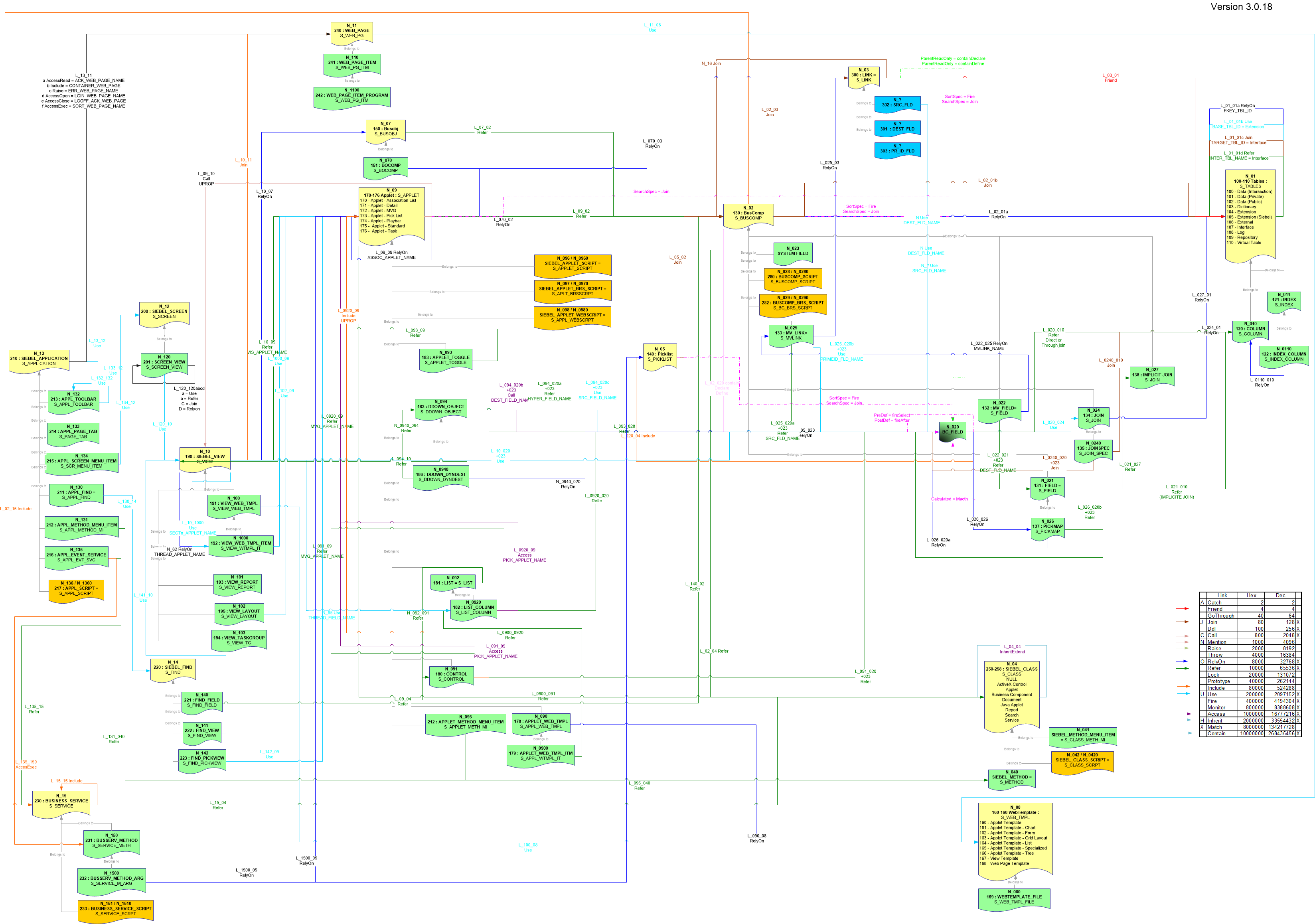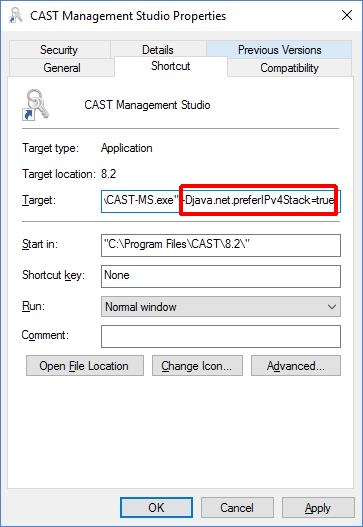Siebel - 5.3
Please ensure that you strictly follow all instructions exactly as described in this documentation. Failure to do so may result in a failed installation or erroneous results. For example:
- Please do not use these instructions with previous releases of the Siebel extension, and vice-versa.
- Please avoid creating your own User Defined Modules - please follow the User Defined Modules configuration exactly as described in Onboarding with CAST Imaging Console.
Extension ID
com.castsoftware.siebel
What’s new?
Please see Siebel 5.3 - Release Notes for more information.
Description
This extension provides support for Siebel.
In what situation should you install this extension?
The Siebel Analyzer has been designed mostly for its quality model inspired by customer best practices as well as Siebel review checklists. Hence it fulfils the use cases using the CAST Dashboard.
Supported Versions of Siebel
This extension provides support for the following Siebel versions:
| Siebel version | Supported | Comments |
|---|---|---|
| 7.5 | ||
| 7.7 | ||
| 7.8 | ||
| 8.0 | ||
| 8.1.x.x | ||
| 15.x (8.1.1.15/8.2.2.15, IP 2015) | New functionalities or syntax
introduced in these versions are NOT supported, but this does not affect
the results. |
|
| 16.x (IP 2016) | ||
| IP 2017 IP 2018 IP 2019 20.x 21.x 22.x |
New functionalities or syntax introduced in these versions are NOT supported, but this does not affect the results. Limitation starting from 17.x (IP 2017): The Siebel Analyzer can ONLY extract from Siebel repositories that do NOT have the Workspace option enabled. If you attempt to run an extraction on a repository with the Workspace option enabled, the following error will be logged in the extractor log when using Siebel ≥ 5.3.2: If the Workspace option is enabled and you wish to perform an extraction, then you must apply the flattening process before you run the extraction, as per the following third-party documentation: https://docs.oracle.com/cd/E88140_01/books/UsingTools/using_workspaces39.html#wp1013245. |
|
| 23.x and above | likely* | New functionalities or syntax introduced in these versions are NOT supported, but this does not affect the results. In addition to the Workspace limitation described previously: * The Siebel repository tables "S_" are stable and have not changed for quite some time. As such, the extractor will likely extract the objects and links as expected, and the rest of the analysis process will complete without issue. |
Function Point, Quality and Sizing support
This extension provides the following support:
- Function Points (transactions): a green tick indicates that OMG Function Point counting and Transaction Risk Index are supported
- Quality and Sizing: a green tick indicates that CAST can measure size and that a minimum set of Quality Rules exist
| Function Points (transactions) |
|
|---|---|
| Quality and Sizing |
AIP Core compatibility
This extension is compatible with:
| AIP Core release | Supported |
| 8.3.x |
Supported DBMS servers
For AIP Core schemas
| DBMS | Supported |
| CAST Storage Service/PostgreSQL |
For Siebel applications
The extension supports Siebel applications installed on the following DBMS:
| DBMS | Supported |
| Oracle Server | |
| DB2 UDB | |
| Microsoft SQL Server |
Prerequisites
| AIP Core | An installation of any compatible release of AIP Core (see table above). If you are using AIP Console to manage the analysis, you must use AIP Core ≥ 8.3.39. | ||||||||||||||||||||||||||||
|---|---|---|---|---|---|---|---|---|---|---|---|---|---|---|---|---|---|---|---|---|---|---|---|---|---|---|---|---|---|
| AIP Console | If you would like to use AIP Console to manage the analysis, please ensure that you are using v. ≥ 1.27. | ||||||||||||||||||||||||||||
Vanilla repository availability |
Please ensure that the Vanilla repository is online and available before starting.
Note that the Vanilla repository must have the same Siebel version as
the Project repository, and same series of Siebel patches.
|
||||||||||||||||||||||||||||
On Siebel server hosting the Oracle/DB2/Microsoft SQL Server repository (for Vanilla and Project) |
For the list of S_* tables, see Tables required to grant
access to the Siebel repository.
|
||||||||||||||||||||||||||||
On Workstation used for extraction (where the CAST Database Extractor / CAST Delivery Manager Tool is deployed) |
|
||||||||||||||||||||||||||||
On AIP Node used for analysis |
|
||||||||||||||||||||||||||||
On CAST Storage Service/PostgreSQL instance used for analysis |
Disk space requirements Disk space depends on the Siebel version implemented by the customer:
Disk speed requirements Siebel analysis incurs heavy disk usage. Disk I/O throughput (not necessarily speed) is possibly the most important factor to determine the analysis time. So far we have tested three environments with the tool iometer, following this how-to. The rough results are these:
|
||||||||||||||||||||||||||||
Tables required to grant access to the Siebel repository |
The following database tables are accessed during the Siebel extraction process: SIEBEL_TABLES.txt. |
FAQs
Please see PeopleSoft & Siebel FAQ for more information.
Download, installation, configuration and operating instructions
See Onboarding with CAST Imaging Console.
What results can you expect?
Objects
The objects listed below are all the object types that a Siebel analysis will deliver in the Analysis Service. With these objects, CAST is capable of supporting a set of quality rules to provide a customer with a good overview of the current technical status of a Siebel application. It is not the intention of CAST to capture all details and syntaxes; a coupling between requirement and detection is made.
Click to enlarge or download it here:

The Siebel extension is capable of detecting a large number of objects, properties and links. All of these artifacts are mentioned in the picture above, but in essence, all Siebel objects are supported:
| Icon | Metamodel description |
|---|---|
|
Siebel Application |
|
Siebel Screen |
|
Siebel View |
|
Siebel Business Objects |
Applets
| Icon | Metamodel description |
|---|---|
|
Siebel Applet - Association List |
Siebel Applet - Detail |
|
| Siebel Applet - MVG | |
| Siebel Applet - NULL | |
| Siebel Applet - Pick List | |
| Siebel Applet - Playbar | |
| Siebel Applet - Standard | |
| Siebel Applet - Task |
Business Component
| Icon | Metamodel description |
|---|---|
|
Siebel Business Component |
Table
| Icon | Metamodel description |
|---|---|
|
Siebel Table Data (Intersection) |
| Siebel Table Data (Private) | |
| Siebel Table Data (Public) | |
| Siebel Table Dictionary | |
| Siebel Table Extension | |
| Siebel Table Extension (Siebel) | |
| Siebel Table External | |
| Siebel Table External View | |
| Siebel Table Interface | |
| Siebel Table Log | |
| Siebel Table Repository | |
| Siebel Table Virtual Table | |
| Siebel Table Warehouse | |
| Siebel Table Unkown Type |
Web Template
| Icon | Metamodel description |
|---|---|
|
Siebel Web Template - Applet Template |
|
Siebel Web Template - Applet Template - Chart |
| Siebel Web Template - Applet Template - Form | |
| Siebel Web Template - Applet Template - Grid Layout | |
| Siebel Web Template - Applet Template - List | |
| Siebel Web Template - Applet Template - Specialized | |
| Siebel Web Template - Applet Template - Tree | |
| Siebel Web Template - View Template | |
| Siebel Web Template - Web Page Template |
Class
| Icon | Metamodel description |
|---|---|
|
Siebel Class - ActiveX Control |
| Siebel Class - Applet | |
| Siebel Class - Business Component | |
| Siebel Class - Document | |
| Siebel Class - Java Applet | |
| Siebel Class - Report | |
| Siebel Class - Search | |
| Siebel Class - Service |
Misc
| Icon | Metamodel description |
|---|---|
|
Siebel Link |
|
Siebel Picklist |
|
Siebel Web Page |
Structural rules
The following structural rules are provided:
| 5.3.0 | https://technologies.castsoftware.com/rules?sec=srs_siebel&ref=||5.3.0 |
You can find a global list here: https://technologies.castsoftware.com/rules?sec=t_1520000&ref=||
Known issues/limitations
The following section lists all known issues/limitations in this release of the extension.
Unable to establish a connection while performing the database repository extraction
Situation
When attempting to extract the Siebel database repositories (Vanilla or Project), when using:
- The standalone CAST Database Extractor using the Siebel-Extract-CLI.bat batch file
- The CAST Delivery Manager Tool (DMT) launched via the CAST Management Studio
Note that the exact situation in which the issue occurs is currently unknown.
Symptoms
The following error is logged, stopping the extraction process:
Unable to establish a connection to: jdbc:oracle:thin:@<ip>:1521:<instance> => The Network Adapter could not establish the connection
Workaround
The workaround to this issue involves manually adding a specific Java runtime option (-Djava.net.preferIPv4Stack=true) and then attempting to rerun the database extraction:
Standalone CAST Database Extractor using the Siebel-Extract-CLI.bat batch file
If you are using the standalone CAST Database Extractor with the Siebel-Extract-CLI.bat batch file to perform the database extraction, you must add the specific Java option to the batch file at line 163, immediately after %JAVA_EXE%:

CAST Delivery Manager Tool (DMT) launched via the CAST Management Studio
If you are using the CAST Delivery Manager Tool (DMT) launched via the CAST Management Studio to perform the database extraction, you must add the specific Java option to the shortcut that runs the CAST Management Studio executable on your workstation. Add the option to the Target field, immediately after CAST-MS.exe" : -Djava.net.preferIPv4Stack=true

Note that you will need to close the CAST Management Studio and re-open it if it was running when you made the change to the shortcut.
Error when displaying source code in the CAST dashboards
Most Siebel objects don’t have associated source code as they correspond to a configuration (example: an applet). In the CAST dashboards an error will therefore be displayed when trying to display the object source code (example error message from the legacy CAST Engineering Dashboard):
No bookmarks are displayed for violations in source code in CAST dashboards
When using the CAST dashboards, no “bookmarks” will be displayed to indicate where violations occur in source code. This is a limitation of the extension.
Miscellaneous information
This section explains various miscellaneous information that is important to understand.
Running a CAST AIP upgrade or an Extension upgrade
This note is valid in the following situations:
- Running a CAST AIP upgrade (major/minor or Service Pack)
- Running an Extension upgrade (not limited to an upgrade of the Siebel extension)
- Using the Component Update/Component Reinstall options in CAST Server Manager
When any of the above actions are performed, the Siebel custom tables located in the VANILLA_SCHEMA will be recreated and all data will be overwritten and lost. In this situation, you MUST use the Run Analysis only option in the CAST Management Studio (on the Vanilla application) to re-populate the custom tables (used for the discrimination step during the Project snapshot generation) before you run the Project snapshot.